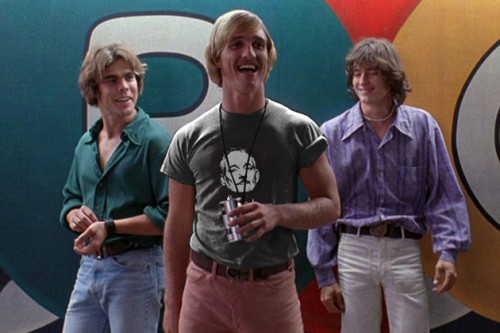
Set to start my senior year of college, a few interactions from my first semester in Charlottesville still stick with me. One was a question my advisor asked me as I anxiously slumped into a chair in his office for the first time. The second is a comment I made over lunch with a professor I respect and am hugely intimidated by.
The question that sent me squirming in my seat was a seemingly simple one: “What are you passionate about?” … Crickets. He prodded, offering up easy suggestions for an 18-year-old male: sports, food, money, girls … “Sex?” he even asked, in a slightly creepy, yeah-I-went-there, kind of way.
First of all, as the ever-skeptical college-aged-male, the word “passion” arouses my suspicions. Any person who oozes about their passions – for fixing up old houses, for their tomato garden, for helping the poor, for saving the environment – has my doubts. That type of talk is so often disingenuous, especially when applied to things for which there doesn’t seem to be much real possibility of long-term, sustai ned passion or fulfillment. It may be a cynical view, perhaps, but it feels more legitimate after a summer hearing and reading repeatedly about keys to long-term marriages, i.e. passion is only one component among many. Plus, while being passionate about a relationship seems right–something I feel for my family and friends and hopefully my spouse when I’m married–it’s not the same at all as a passion for educational innovation or international business.
ned passion or fulfillment. It may be a cynical view, perhaps, but it feels more legitimate after a summer hearing and reading repeatedly about keys to long-term marriages, i.e. passion is only one component among many. Plus, while being passionate about a relationship seems right–something I feel for my family and friends and hopefully my spouse when I’m married–it’s not the same at all as a passion for educational innovation or international business.
If I had had a decent answer for my advisor that day, the event probably wouldn’t have been too memorable. Yet, I’m glad I didn’t have a well-rehearsed response. “Well, I’m really passionate about x, y and z, and I want to implement some innovative ideas and change the world,” for example. That sounds like a recipe for disillusionment and self-serving relationships to me. My most honest answer would have related to a trend Mark Edmundson notes in his book, Why Teach? Straight up, I could have said, “I’m passionate about being cool. I want to find a good mix of work and play, please my parents while taking interesting (meaning stimulating and entertaining) classes.” Here’s Edmundson’s take, as he puts it better than me:
The pervading view is the cool consumer perspective, where passion and strong admiration are forbidden. ‘To stand in awe of nothing, Numicus, is perhaps the one and only thing that can make a man happy and keep him so,’ says Horace in the Epistles, and I fear that his lines ought to hang as a motto over the university gates in this era of high consumer capitalism.
Students worry that taking too many chances with their education will sabotage their future prospects. They’re aware of the fact that a drop looks more and more like one wall of the Grand Canyon separates the top economic tenth from the rest of the population. There’s a sentiment currently afoot that if you step aside for a moment to write, to travel, to fall too hard in love, you might lose position permanently. We may be on a conveyor belt, but it’s worse down there on the filth-strewn factory floor. So don’t sound off, don’t blow your chance.
The sad truth, and one that became apparent in that initial meeting, is that I didn’t really have the tools to sound off. Love, travel, writing, those all would have been good answers, but emerging from high school I had no idea. I was really too focused on “cool” to know how to sound off or what on earth I would sound off on. I had learned how to deflect such a question and avoid getting into what really makes me tick or taking an introspective look at my real values. I knew how to “keep face.”
This reminds me of a section from Julie Scelfo’s recent NYT piece that DZ wrote on earlier this week. I think Edmundson’s insight into the “cool consumer” student helps make sense of Julie Lythcott-Haims’ observations as she began to advise students at Stanford.
These cultural dynamics of perfectionism and overindulgence have now combined to create adolescents who are ultra-focused on success but don’t know how to fail.
Beginning in 2002, when she became dean of freshmen at Stanford, Julie Lythcott-Haims watched the collision of these two social forces up close. In meetings with students, she would ask what she considered simple questions and they would become paralyzed, unable to express their desires and often discovering midconversation that they were on a path that they didn’t even like.
“They could say what they’d accomplished, but they couldn’t necessarily say who they were,” said Ms. Lythcott-Haims.
The “path” from Scelfo is the “conveyor belt” for Edmundson. The sure-fire route to present-day success, and, most importantly, economic security. And it’s succeeded as such: putting people into high-paying jobs and fast-moving cities and pouring money back into elite institutions. But, as Scelfo and Edmundson realize and the overwhelming depression and suicide data points to, it’s failing in some big ways. Namely, there’s no thought for the person and or the cultivation of an inner life, deciding what really matters, finding one’s “passions.”
 This gets to the basic dilemma I came up against in my second memorable encounter, this time over lunch with a professor. Munching on the rare, college dining hall egg-salad sandwich, my freshman self paused to justify my choices of study. “I really want the best return on my parent’s investment,” I said. That was my well-reasoned outlook on my four years. I need to get the most I can out of their generous investment.
This gets to the basic dilemma I came up against in my second memorable encounter, this time over lunch with a professor. Munching on the rare, college dining hall egg-salad sandwich, my freshman self paused to justify my choices of study. “I really want the best return on my parent’s investment,” I said. That was my well-reasoned outlook on my four years. I need to get the most I can out of their generous investment.
In Aziz Ansari’s Modern Romance, a great book that’s been circulating around the Mbird office, he uses an illustration that fits here perfectly. He describes two types of decision making for college students entering the job market: the “maximizing” and the “satisficing.” Maximizers exhaustively explore all their options to find the best-paying job available in the best city with the best benefits. Satisficers tend to wing it, find the first option and go with it. Maximizers sound smarter and more thorough. Viewing my college education from an 18-year-lens, I wanted to be a maximizer, and I’m sure an overwhelming number of my peers would fall in the same camp.
Ansari went on to present the data on the respective happiness of maximizers versus satisficers and found that the maximizers weren’t any happier in their jobs. If anything, there was far more disappointment and frustration in their group.
While they have the proven potential to lead to money and success, the cool consumer mindset and the maximizer attitude aren’t making people happier. Instead we hop on the treadmill, turn up our headphones and get busy being busy. Edmundson closes an essay on identity and the potential to lose it with an honest look at life on his “conveyor belt.”
If you want to live someone else’s dreams rather than yours (a helicopter parent, e.g.) – then get a TV for every room, buy yourself a lifetime supply of your favorite quaff, crank up the porn channel, and groove away. But when we expend our energies in rightful ways, Robert Frost observed, we stay whole and vigorous and we don’t get weary. ‘Strongly spent,’ the poet says, ‘is synonymous with kept.’
My Christian upbringing would tell me, no wonder people aren’t happy on the conveyor belt, they don’t know have a fulfilling relationship with God. While there may be some truth there, I now wonder if such a diagnosis could be a tad naive. The gospel is no more a ticket to surefire happiness than straight A’s and a high paying job won’t insure a great life.
Edmundson calls religion a “safety net” for the cool consumer, a small corner of life that doesn’t mean much and reveals a lack of self-examination. My experience with the Christian constituency at UVA has been considerably more hopeful. That is, faith means a lot to a lot of people, and if anything, it fuels an enormous amount of self-examination. Yet in one sense, I agree with him. The gospel is our safety net. In fact, it is safety itself: the message about a God whose passion reaches from the conveyor belt all the way down to the factory floor.

COMMENTS
2 responses to “Passionate vs. Cool: Performancism in College”
Leave a Reply















DP, I don’t know if it’s a comfort to you or not, but it’s amazing how much of this post still resonates with my decision-making now, all these years post-college. For a lifelong maximizer, I’m comforted by the safety net. Thank you!
brilliant